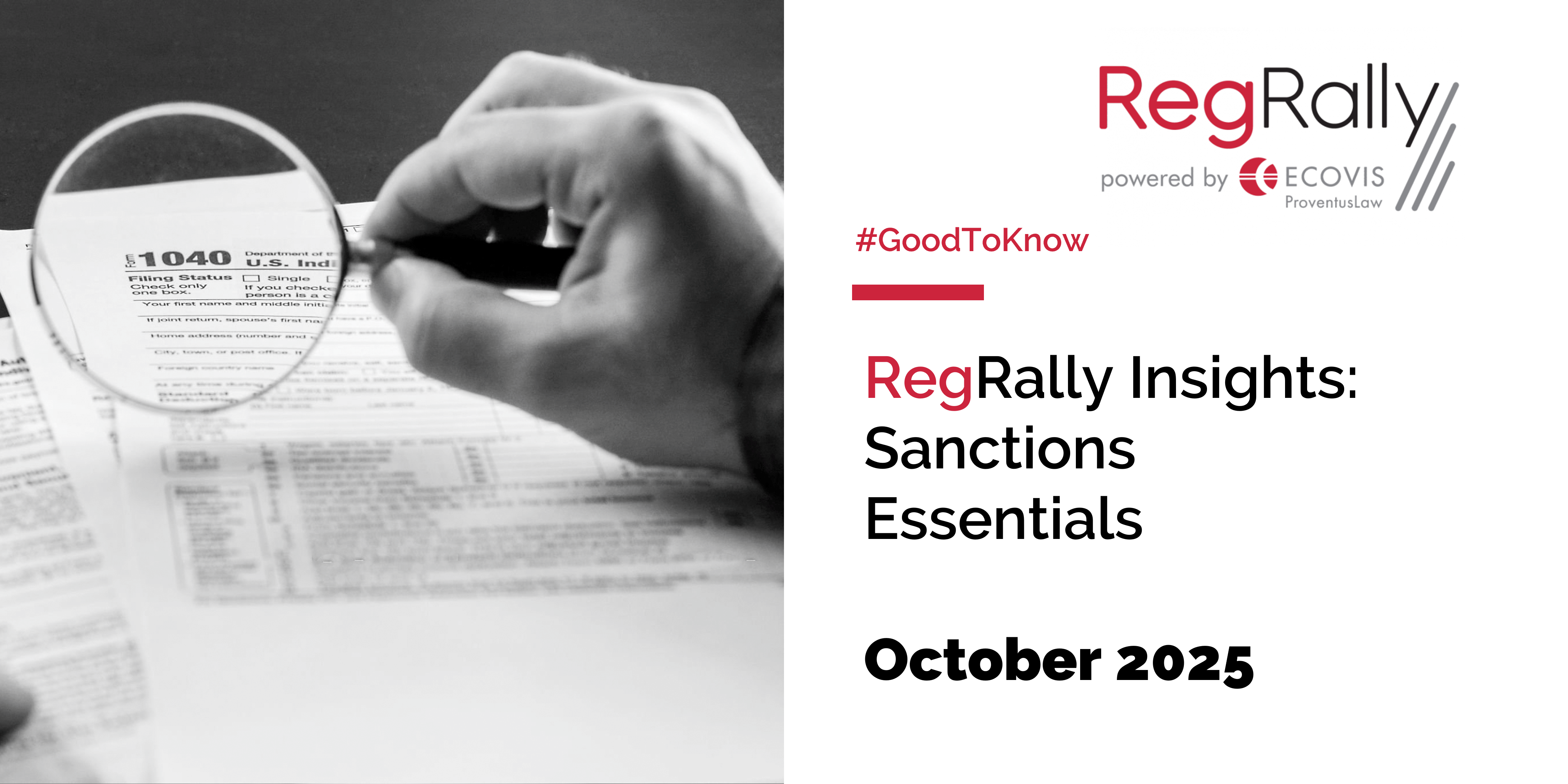ECOVIS ProventusLaw welcomes you to its monthly newsletter on Sanctions, which is dedicated to everyone who wants to understand the latest trends and developments, get tips from sanctions experts, and deepen their knowledge.
EU Expands Sanctions to Include Crypto-Assets
On September 26th, the European Commission adopted its nineteenth package of restrictive measures against Russia, marking the first time EU sanctions directly prohibit Russian residents’ use of crypto-asset platforms. The new rules extend sanctions beyond traditional banking and payments to digital financial services, aiming to curb crypto-assets’ use in sanctions evasion, including prior attempts by Russian oil companies to transact via Bitcoin or Tether.
The package also targets foreign financial institutions tied to Russia’s alternative payment systems and blocks transactions with entities operating in special economic zones. These measures build on earlier actions, such as the designation of the Russian crypto exchange Garantex, whose wallets were frozen by Tether in coordination with EU enforcement. The move underscores a strategic shift: the EU now treats the digital asset sector as central to sanctions compliance, closing remaining circumvention channels and sustaining economic pressure on Russia.
Recommended Actions for Businesses:
- Conduct a comprehensive review of client and counterparty relationships to identify any links with Russian residents, entities in special economic zones, or designated organisations.
- Strengthen sanctions screening and monitoring to cover crypto-asset transactions, account services, and custody operations.
- Update internal policies on digital asset flows, wallet access, and service provision to comply with prohibitions on serving Russian persons or entities.
- Assess exposure to correspondent or partner banks connected to Russia’s alternative payment networks and develop mitigation strategies for potential new restrictions.
EU Extends Sanctions Against Individuals Undermining Ukraine’s Sovereignty
On 12 September 2025, the EU Council extended its individual restrictive measures against more than 2,500 individuals and entities responsible for actions undermining Ukraine’s territorial integrity, sovereignty, and independence. Initially adopted in response to Russia’s military aggression, these measures have been prolonged until 15 March 2026.
The sanctions comprise travel bans, asset freezes, and prohibitions on providing funds or economic resources to designated persons and organisations. The EU reaffirmed its readiness to further strengthen pressure on Russia by adopting additional restrictive measures if required.
EU Reimposes Comprehensive Sanctions on Iran
On 29 September 2025, the EU Council reimposed sanctions on Iran under the Joint Comprehensive Plan of Action (JCPoA) “snapback” mechanism, in response to Iran’s failure to meet nuclear commitments.
The measures include travel bans, asset freezes, and prohibitions on providing funds or economic resources to listed individuals and entities. Key sectors affected include energy, trade, finance, and transport, with restrictions on oil, gas, petrochemicals, precious metals, specific equipment, Iranian banks, and cargo operations.
This action underscores the EU’s commitment to non-proliferation and enforcing compliance with nuclear obligations.
EU Extends Sanctions on Sudan
On 22 September 2025, the Council of the European Union extended the sanctions regime concerning Sudan until 10 October 2026. The measures target individuals and entities responsible for destabilising Sudan and obstructing its political transition.
The sanctions include EU-wide travel bans, asset freezes, and prohibitions on making funds or economic resources available to the listed parties, directly or indirectly. Currently, they apply to ten individuals and eight entities. Initially introduced in October 2023, the regime has been updated periodically to address the evolving situation. These actions aim to support Sudan’s stability and political transition by holding those undermining peace and governance efforts accountable.
Recommendations:
- Freeze assets and block transactions involving listed individuals and entities.
- Apply enhanced due diligence (EDD) for clients and counterparties linked to Sudan or sanctioned parties.
- Update sanctions screening systems and ensure staff are aware of compliance obligations.
Latvia Shares Experience in Implementing EU Sanctions on Russia
Latvia has highlighted its approach to implementing and enforcing EU financial sanctions against Russia, stressing the importance of uniform and coordinated execution across member states.
The Financial Intelligence Unit (FIU) of Latvia has centralised sanctions operations, ensuring consistent asset freezes, maintaining a verified register of frozen assets, and closely monitoring payments and trade flows. This method has contributed to approximately 600 criminal proceedings related to trade-based sanctions breaches.
Latvia has also provided extensive guidance to businesses to facilitate compliance and emphasised the need to regularly assess sanctions effectiveness and focus enforcement where it has the most significant impact. The FIU further noted risks of circumvention, including via third countries and cryptocurrencies, with the EU’s 19th sanctions package enabling action against non-EU crypto service providers aiding Russia.
OFAC Updates Russia-Related Guidance
On 29 September 2025, the U.S. Department of the Treasury’s Office of Foreign Assets Control (OFAC) issued Russia-related General License 13O, authorising certain administrative transactions previously prohibited under Directive 4 of Executive Order 14024.
In addition, OFAC updated FAQ 999 and FAQ 1118, further clarifying the scope and application of Russia-related sanctions.
Recommendations:
- Review internal processes to determine whether any transactions fall under GL 13O and ensure they are executed in compliance with its terms.
- Update staff on changes and guide the correct application of Russia-related sanctions.
- Monitor OFAC updates regularly, including FAQs, to stay current with clarifications and avoid inadvertent violations.
UK Publishes Starter Guide to Sanctions
On 22 September 2025, the UK Government released a Starter Guide to UK Sanctions, which aimed at helping firms and individuals understand the design, application, and enforcement of UK sanctions in the financial, trade, transport, and immigration sectors.
The guide covers:
- Scope of UK sanctions for individuals, businesses, and organisations globally.
- Operation of sanctions lists, licensing, and exceptions.
- Due diligence, ownership/control checks, and indicators of circumvention.
- Practical guidance for compliance teams, senior management, and business lines.
Recommendations:
- Use the guide to brief senior leadership and board members on sanctions risks and governance responsibilities.
- Conduct a gap analysis comparing current sanctions policies against the guide and remediate deficiencies.
- Integrate the guide into onboarding and ongoing training for client-facing, operations, and financial staff responsible for sanctions checks.


 Newsletter Subscription
Newsletter Subscription